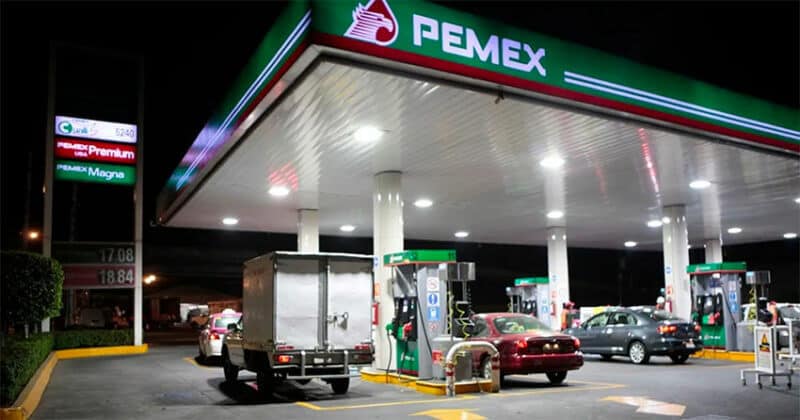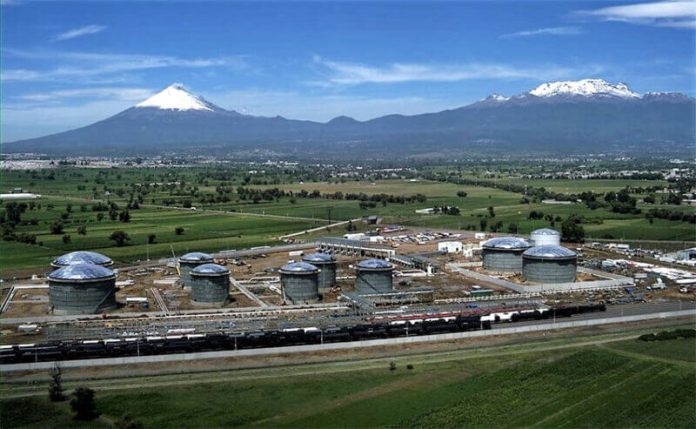The federal government has dealt another blow to private companies in Mexico’s energy sector.
The Energy Regulatory Commission (CRE) has shut down three privately owned fuel storage terminals in the last month and a half, a move that will likely benefit the state oil company Pemex.
The terminals are used to import fuels such as gasoline and diesel and are located in Tuxpan, Veracruz, Puebla city and Hermosillo, Sonora.
Alejandro Montufar, CEO of the consultancy firm PetroIntelligence, said the reasons for the closures were not entirely clear.
However, unnamed energy sector sources cited by the newspaper Reforma claim that the government is seeking to link private companies to the distribution and sale of illegal fuel.
“The government wants to return to a gasoline monopoly,” the sources said, referring to the situation in Mexico before the 2013 energy reform.
The CRE temporarily closed the Monterra Energy terminal in Tuxpan on September 13, Reforma reported. Owned by the United States-based global investment firm KKR, the terminal imports fuel transported on ships owned by companies such as Total, Repsol and Marathon, which operate gas stations in Mexico.
The CRE, ostensibly an autonomous federal body, previously closed the IEnova terminal in Puebla, which supplies Valero gas stations, and a Bulkmatic terminal in Hermosillo, which supplies Valero and Marathon.
In addition to the closures, CRE personnel accompanied by the National Guard last week carried out an inspection of another private terminal in Tuxpan, where some 80% of gasoline consumed in Mexico enters the country.
The CRE officials temporarily prevented a ship from offloading fuel at the Invex terminal, Reforma said, adding that the vessel was placed under a closure order because it allegedly didn’t have the appropriate permits.
“… They put a closed seal on the boat but that boat was adhering to international legislation and it managed to unload in the end,” a source with knowledge of the matter told Reforma.

Pemex gas stations would benefit from a restriction on imports, but supplies might be a problem.However, the Energy Ministry subsequently canceled five import permits the ship had obtained to bring fuel such as diesel, gasoline and jet fuel into the country. The ship was allegedly conducting business with companies that don’t have the required permits to operate in Mexico’s energy industry.
Alicia Zazueta of the oil sector firm eServices described the government’s closure of terminals and the revocation of permits as discretional, suggesting that it is targeting private companies arbitrarily.
The cancellation of permits and the closure of terminals will limit fuel supply options and return control of the market to Pemex, she said.
Claudio Rodríguez, a lawyer with Holland & Knight who specializes in energy matters, said it was clear that the government is intent on returning the state oil company to a dominant position in the market, which was opened up to private and foreign companies by former president Enrique Peña Nieto.
However, there is a risk that Pemex won’t be able to satisfy market demand, he said.
“On the issue of medicines, a shortage was created by cutting private companies’ distribution networks … [because] the government didn’t have the capacity to supply the national market. There is an enormous risk of falling into the same situation with fuel … [because] Pemex doesn’t have the capacity to supply the market,” Rodríguez said.
“Dogmatism has dictated energy policies in Mexico for three years,” he added, referring roughly to the period President López Obrador – a staunch energy nationalist – has been in office.
“The fewer terminals there are, the less competition there is for Pemex. That’s a fact,” said Montufar of PetroIntelligence.
The CRE’s actions could lead to fewer privately owned gas stations in Mexico and higher fuel prices, he said.
“But that would be in a medium or long term scenario if we see the revocation of terminal permits,” Montafur said.
Since López Obrador – who has pledged to “rescue” Pemex and the state-owned Federal Electricity Commission from years of neglect – took office in late 2018, the government has enacted a range of policies designed to make the state a more prominent player in the energy sector.
Many have faced legal challenges from private companies, and some, including an Energy Ministry policy that imposed restrictive measures on the renewable sector, have been suspended by court order.
With reports from Reforma
